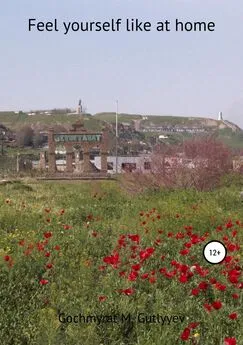Gochmyrat Gutlyyev - Feel yourself like at home
- Название:Feel yourself like at home
- Автор:
- Жанр:
- Издательство:неизвестно
- Год:2019
- ISBN:нет данных
- Рейтинг:
- Избранное:Добавить в избранное
-
Отзывы:
-
Ваша оценка:
Gochmyrat Gutlyyev - Feel yourself like at home краткое содержание
Feel yourself like at home - читать онлайн бесплатно ознакомительный отрывок
Интервал:
Закладка:
I am underlying the fact because I also lived on another Southern state line, Afghanistan’s. Surely, nearly all Americans whom I interacted those days were not aware of my native country, Turkmenistan. That is why I decided to indicate its geographical location by stating – “I am living just on Northern border of Afghanistan. Let me to emphasis that my visit occurred after the tragic 9/11 event, when a shock was not subsided yet. And all Americans may know where the country is located .
During our next friendly tea-drinking Leon suddenly said with warmth and sincerity “you are a really enjoyable guest”. It sounded so unexpected and strange for me that I asked right away to clarify what he meant. Just then I discovered that he had some apprehension anticipating my visit because during his long life (to the date about ninety years old) it was the first time he met a Turkmen, and he did not want to offend a visitor by not knowing some details of my culture or any sensitivities that I might have. Of course, I was quick to calm my courteous host that the tradition of hospitality is imbibed into our blood as well as respecting others folkways, whose homes we would be staying. Leon and all his numbered family showed boundless patience and warmness towards me.
Much later, during the last week of my four months long tour in miraculous California, I remember sitting with Steven Torres himself in a cozy café at the outskirts of Sacramento at the local Farmers’ Market. We talked thirstily, of endless themes and experiences. He reflected on my journey and challenges, and I needed to explain in more details, how “now-became-theirs” this visitor from the opposite side of the globe entered into their everyday mode of life relatively easy. My now true friend in half voice remarked: “I am astonished how calmly you are feeling yourself among us, Americans. If I should appear in strange country, I do not think I would be able to behave with the same confident manner among those folks”. I told him that there was a period of life where I was the leader of the only alpine club in Turkmenistan. My challenge was to introduce a course of lectures aimed for beginners that required considering the “subtle manners of behavior in remote areas, in order not to touch the feelings of local people”. And I added that even before this period of my life I developed my own steady habit to trying to find any written materials regarding a region and the people of it, as preparation for where I travel. Naturally I acted the same way too, when getting ready for a trip to the United States in order to take part in Contemporary Issues Fellowship Program. That’s why it was quite an explainable matter that in my case a cultural shock was not detected so sharply as it was for some of the other participants of our round. Besides, I was ready to face any habits/behaviors of Americans which might seem strange for a foreigner, and to expect their possible funny questions. Nevertheless, I made several observations on the issue which may cause a smile, even for those who experienced themselves with the Americans’ mode of life.
I should admit that during a friendly party during this trip, I caught me myself with the worrisome fact (of course, not burst out aloud): “though, if preparing for a trip to my country, and try to look for literature related to everyday life of Turkmen, you would spend a lot of efforts for the task, and you would not find anything written in an intelligible style, at all…” Surely, there should be some dry scientific treatises covering a FEW aspects of traditions and rituals of Turkmenistan somewhere? But what about popular versions designed for a common person interested in the culture and customs of an unknown nation? Just then and there a vague idea started to develop in my mind: “why don’t I try to write something like a guide-book on mentality, traditions and mode of life of my own folks?” Let me add that this idea was born not on a blank slate of stone, but laid into prepared soil, sorry for an agricultural concept.
I should mention that my second profession and dearest hobby is that of a cultural guide. I worked several years as a guide-interpreter in tourism spheres (for few tourist agencies) in tight and direct contact with inquisitive guests of Turkmenistan, from many different countries in second half of the 1990’s. So I was often needed to answer uninterrupted questions: For example, “What does your name mean? How do Turkmen greet each other and strangers? What is your traditional meal?” Plus, I needed to be ready for utterly unexpected requests for the presence of these totally unprepared guests. For instance, when I was leading a sightseeing tour of a unique mosque at the town of Annay located at outskirts of metropolitan Ashgabat, a Japanese group (themselves surprised) became invited guests at sadaka [2] Sadaka – special ritual, an event to sacrifice in order to thank Heaven for a blessed support in life
, dedicated to the new birth of grandson and son after many long years of awaiting. It is understandably that ceaseless sizzles of photo cameras and buzzing of videos were started at once, because the Japanese “took aims” at all details of the exotic event for them. Part of this celebration Included cooking a very caloric dishes for which their stomachs would be unaccustomed – pilaff in giant kazans [3] Kszan – a big round cauldron, of volumes between of 40-100 liter.
, chorba [4] Chorba – a traditional soup of mutton and onions. To diverse it is allowed to add potatoes and tomatoes.
with pieces of fat floating on a surface. Of course, they declined the courteous invitation of these cordial hosts and did not partake in the meals. So, how should you advise them to follow a national custom “duzyny datmak” (“to taste a salt” [5] “To taste a salt” – a ritual joining to a meal. A one should take at least a drop of bread or tiny portion of a course and eat it. It will be a token that he/she “shares” the meals. Refusing the procedure might be taken as rudeness and an offence.
)? They would need to be instructed about the history and expectations of guests and to caution them that certain behaviors or responses might be taken as arrogant “duzdan uly bolma” (“do not put yourself higher than a salt”) by locals. I interrupt the telling of this story at halfway, because unrolling the full story has a plot that will have several aims later. I’m doing this as an enticement, to maintain the curiosity and fascination of your reading: “what else happens later?”
I want to emphasize that during the first period of Independence of Turkmenistan (1991-2000), a flow of foreigners willing to visit our still mystic and mysterious country increased greatly. However, competent guides, speaking fluently in foreign languages and being themselves representatives of our national culture, were literally few. Therefore, not every person, who named himself “a guide-interpreter”, would accurately respond with passion to the ceaseless firing questions about “everyday mode of life”. Meanwhile, let me soothe my kind listeners and readers that I resolved these challenges without any special difficulties, to the great satisfaction and pleasure for all parties involved. I simply used my sharp sense of humor and understanding of important aspects these cultures and behaviors (both nations – Japanese and my own folks). Honestly at this time, if I had material on these issues that was written in the manner of a folktales’ narrator “like talking directly from the first person”, it would have been much easier and more interesting to arrange a dialog with curious traveling guests.
Just then and there, while sitting at the table in cozy café, my initially shy idea was born: “maybe, to try to compose conversations from there and here?” I started by making initial fragmentary field notes, not yet linked to each other. Then my life faced some more urgent tasks and I was forced to put my notes into a far box. About a decade passed and my hair turned grey, and after participation in an international conference in 2007 the idea, now reinforced, returned to me again: “better that I do it myself, than to pass my idea to someone else”. Why? – because participants from other countries have literally bombarded me with the same questions regarding my Turkmen countrymen. They were interested in everything – mentality, nature, and peculiarities of rural life.
Naturally, it is quite understandable that my resulting book does not pretend to be scientific in nature and represent the exact interpretations to the respective country’s traditions. Therefore, exacting critics shouldn’t be in a hurry to find disagreements and/or contradictions. This is the opinion of the author, my own attitude and experiences to this, and my deep and respectful understanding of Turkmen community life. I would even say – this is my invitation to a conversation, an incentive to examine other sources of supplementing information, and to establish a better understanding between cultures. There is a certain abruptness to some of my essays and short stories; some that look like unfinished themes are made intentionally – to think over and find explanations yourself. Then a conversation with a reader can be among equals, not of a mentor with his students, shouldn’t it? That’s why once again I will interrupt this narrative on a half word…
Once again, I will remind you – this is a non-fiction book of my travels, not a detailed journal dissertation.
The Greetings
“A salam is not just yours,
A salam belongs to the Almighty”
A proverbDo you know any other way to start a conversation, tactfully and friendly, when you meet anyone – be it an acquaintance or a stranger, a countryman or a foreigner, a person of your own tribe or a representative of another ethnic group, – if not with a greeting?
And which form of the address should one select – just “Hello!” or “How are you doing?” – based on a specific situation and for a specific audience?
True, some men and women are able to get in touch with any audience, with people previously unknown or only slightly familiar to them, or to enter into a conversation with a stranger quite easily and unconstrained just at very first minutes of a meeting even without a formal greeting such as “hello”.
As for myself, I might look at them with an admiring envy of their excellent communicative skills, honestly. For I had definite difficulties in my youth, sometimes, to start just an elementary conversation – even with an acquaintance, leave alone a stranger, due to certain features of my personality. However, just those initial seconds and minutes are the most important stages when to create required mood of a meeting, to understand intentions of the visitor and to show your attitude towards him, are not they?
Therefore, naturally, styles and forms of greetings have their precious meaning in any culture, whatever the mentality of its people. That is of course, if one takes the subject much wider, without limiting the discussion exclusively to the complicated manner of the Turkmen in the field of addressing and greeting.
Конец ознакомительного фрагмента.
Текст предоставлен ООО «ЛитРес».
Прочитайте эту книгу целиком, купив полную легальную версию на ЛитРес.
Читать дальшеИнтервал:
Закладка:










